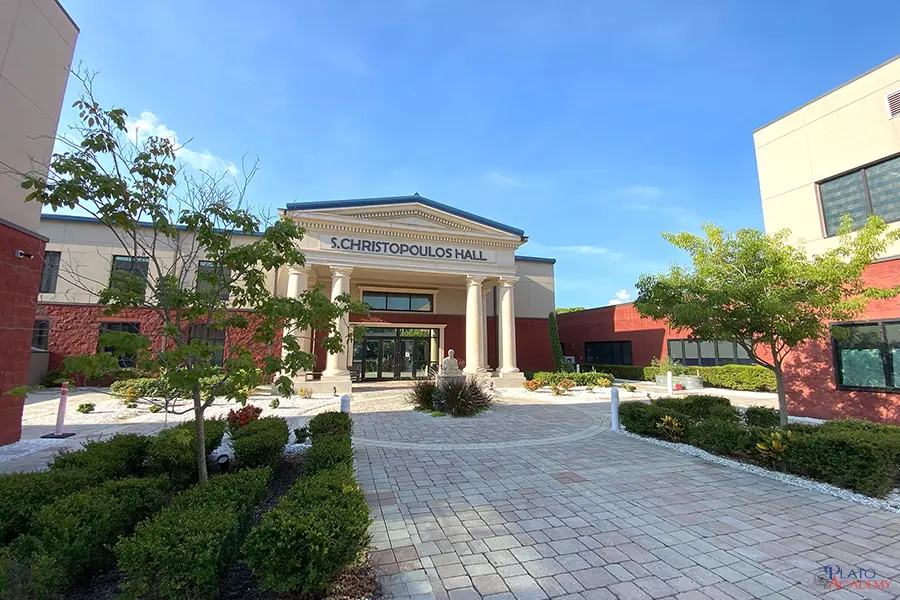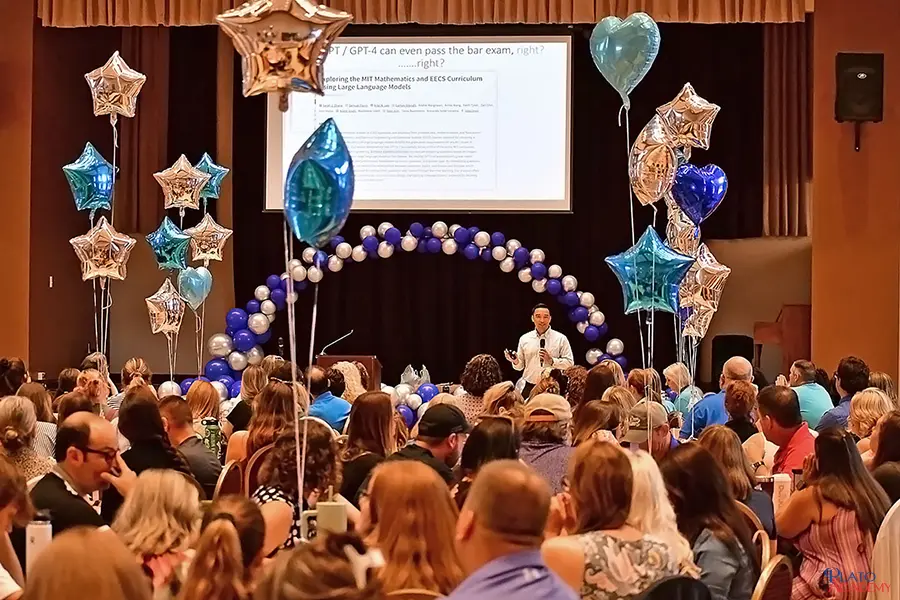Plato Academy Schools, August 2nd, 2023

Every year, the Plato Academy event brings together educators from all nine campuses, creating a vibrant platform for collaboration and preparation as the new school year approaches. This gathering stands as a testament to the institution’s unwavering commitment to staying ahead of the curve in the ever-evolving landscape of education. The event is characterized by informative seminars that shed light on emerging trends in education, equipping teachers with insights to enhance their teaching practice. A key highlight of the conference is the keynote address, and this year’s event was graced by Dr. John Licato, Assistant Professor in the Computer Science and Engineering department at the University of South Florida (USF) and visionary founder/director of the Advancing Machine and Human Reasoning (AMHR) Lab.

Dawn Parker,
Director of Staff Development for Plato Academy Schools
Dawn Parker, Director of Staff Development for Plato Academy Schools, whose opening speech seamlessly transitioned to welcoming newcomers to the profession, recognizing the start of their educational journeys and extending gratitude for their involvement. The spotlight then shifted to educators with 1 to 5 years of experience, applauding their perseverance and dedication during the initial stages of their careers.
The focus of recognition extended to those with 6 to 10 years of experience, acknowledging their profound impact on countless students’ lives despite the personal and professional challenges they’ve faced. Special tribute was paid to the longstanding members of the educational community, celebrating their unwavering commitment to excellence and innovation throughout the years.
Dr. Licato took the stage beginning his keynote speech by highlighting the unique passion and creativity of educators hailing from diverse backgrounds and experiences. He celebrated their collective dedication to the transformative power of education, emphasizing the importance of a united community in driving positive change, nurturing young minds, and fostering creativity.
The spotlight shifted to the integration of AI in education, with Dr. Licato, an expert in natural language processing and AI, taking the lead. He discussed the intricate challenges of distinguishing between AI-generated content and human-generated content, shedding light on instances where AI systems have achieved remarkable results, while raising concerns about identifying and addressing potential academic dishonesty.

Dr. Licato shared instances where AI had successfully solved complex programming problems, often producing results indistinguishable from human-generated solutions. The discussion acknowledged the difficulty of confidently discerning between human and AI-generated content due to AI’s advancements in pattern recognition. The crucial question of how educators could effectively tackle this challenge while upholding academic integrity was posed.

The assertion that AI would be a pivotal aspect of the educational landscape was explored, emphasizing the need for institutions to adapt their policies and approaches to accommodate this new reality. The address concluded by encouraging critical thinking when interpreting claims about AI’s capabilities, stressing the importance of delving into the context and research behind such statements.
Dr. Licato further delved into the challenges posed by AI-generated content, noting its potential impact on education and assessment methods. He emphasized that while the technology itself isn’t new, the modern AI language models, like GPT-3, have evolved to a point where they can produce high-quality text, raising concerns about academic integrity. Dr. Licato illuminated the working principle of language models, explaining their predictive nature based on learned patterns and context from vast datasets. He discussed how these models can engage in dialogue, generate text in various styles, and make jokes, emphasizing that their output is guided by patterns rather than factual accuracy.
Embracing the challenge
The call for educators to proactively adapt to this evolving landscape resounded, with suggestions like in-class assessments and revised grading weight for assignments completed outside class. Dr. Licato emphasized embracing the challenges presented by AI-generated content as opportunities to explore novel teaching methods. The presentation culminated with a call to action, urging educators to collaborate, share experiences, and explore strategies to navigate AI’s impact on education, reminding all that despite challenges, this technology offers exciting prospects for innovation and growth.
After the informative morning session, educators engaged in specialized training sessions aligned with their individual interests, diving deeper into a diverse array of subjects. These focused workshops provided a valuable avenue for teachers to enrich their teaching strategies in line with their goals. As the day progressed, the spotlight shifted to grade level meetings, facilitating collaborative planning sessions during the afternoon. This dedicated time enabled teachers to combine their insights, effectively shaping their strategies for the upcoming school year.
The annual Plato Academy event continues to serve as an instrumental platform, not only in unifying educators from across campuses but also in providing a space for them to equip themselves with the tools and insights needed to tackle the evolving challenges and opportunities of modern education.
